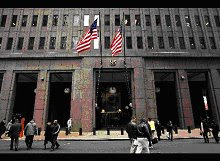Why a US recession might be a necessary adjustment for long-term growth?
In a column of the FT, Ricardo Hausmann - director of Harvard University’s Center for International Development - makes a strong case against the US government plan to inject massive money into the inconomy, explaining that the US consumption needs to be adjusted lower to more sustainable levels. Full article on http://www.ft.com/cms/s/0/28b464a2-cf50-11dc-854a-0000779fd2ac.html Stop behaving as whiner of first resort By Ricardo Hausmann The same voices that supported tough macroeconomic policies to deal with the excesses of spending and borrowing in east Asia, Russia and Latin America are today pushing for a significant relaxation in the US to deal with the so-called subprime crisis. Interest rates should be slashed quickly and $150bn put into taxpayers’ pockets by April at the latest, they say. The Fed cut by another half-point on Wednesday. The goal seems to be to avoid a 2008 recession at all costs. As Larry Summers, former Treasury secretary, put it, failure to act would make Mai
